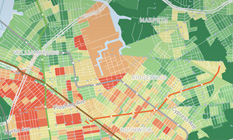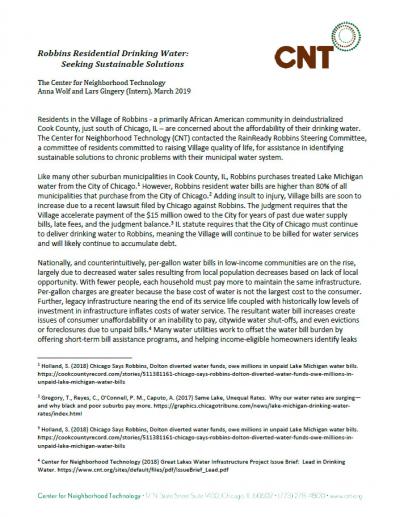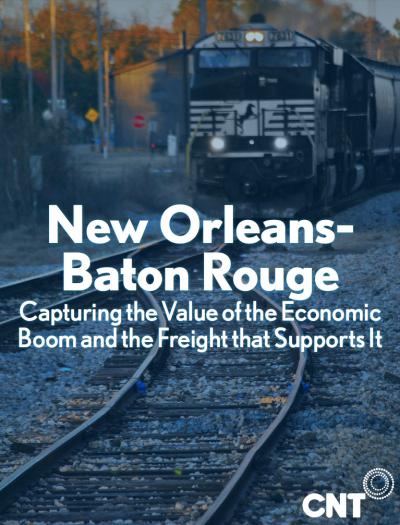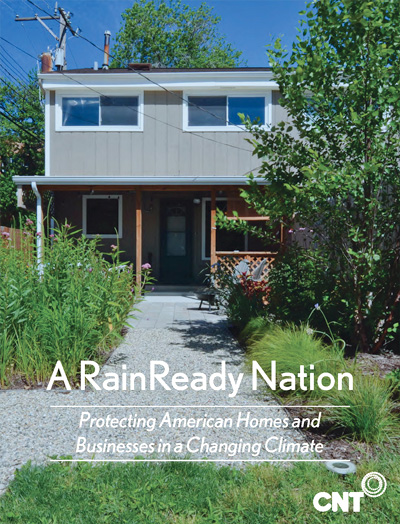To create lasting change, we help governments at all levels incorporate our data-driven ideas into their policies. Developed through extensive research, our solutions help cities, individuals, and businesses make smarter, more sustainable choices about how they get around, build communities, and manage natural resources.
What does this mean for you? Our work has contributed to policy changes across the country:
- Our Housing and Transportation (H+T®) Affordability Index has influenced housing, transportation, and development policy across the nation.
- The California state legislature used a report based on our analysis to support passing a law allocating cap-and-trade funds for affordable housing near transit.
- The Urban Flooding Awareness Act, passed in Illinois and proposed at the federal level, will help pave the way for homeowners who live outside of floodplains get assistance when their homes flood. CNT helped research and promote the act.
- The Brownfields Redevelopment and Intermodal Promotion Act, written and promoted by CNT, was passed in Illinois and funds incentives to remediate and reuse brownfields to create intermodal, warehousing and light manufacturing jobs in southern Cook County.
- CNT President Scott Bernstein helped form the Surface Transportation Policy Partnership, which drafted what would become the bipartisan Intermodal Surface Transportation Efficiency Act (ISTEA). ISTEA enabled federal highway funds to be used on more sustainable mobility options, like cycling and mass transit.
We are also currently advocating for policy changes at the local, state, and federal levels.
State and local policy:
- Transit-oriented development (TOD): We advocate removing regulatory barriers to accelerate equitable TOD, particularly parking minimums and exclusionary zoning. Since local impediments and federal policy reinforce each other, policy change at all levels of government needs to occur to affect the system.
- Priority Development Areas: The region’s GO TO 2040 plan calls for redeveloping 100,000 acres of land and doubling transit ridership. As a result, CMAP, RTA and local communities have created hundreds of plans. Unfortunately, few have been implemented but not because of the lack of resources. The policy change that is needed is the target available resources from federal, state, and local sources towards plan implementation. If GO TO 2040 goals are to be achieved and if the regional’s economy is to grow, then public agencies should allocate their resources to implement plans with the biggest redevelopment impact:
- Target resources to places with a critical mass of people, jobs, or transit, and to neighborhoods with the plans to get there in the future.
- Target transportation programs to neighborhoods with a density of households and jobs.
- Target transportation investments to suburban job centers.
- Target resources to implementation of plans.
- Prioritize resources to opportunity corridors that currently are in need of redevelopment or need a catalyst to spur redevelopment.
- Transit expansion: We advocate for a local revenue stream that can be used to match federal and state funding sources to expand the Cook County’s transit system. We also support a state transportation capital bill that addresses the unmet need of maintaining and expanding the region’s transit system.
- Cargo-oriented development (COD): We advocate for COD to be incorporated into public plans that guide development including land use and zoning provisions, economic development strategies, workforce plans, Metropolitan Planning Organization (MPO) Long Range Transportation Plans and state freight plans.
- Urban Flooding Awareness Act (UFAA): In 2014, CNT worked successfully with Illinois State Rep. Mike Fortner to pass legislation in the General Assembly that requires the Illinois Department of Natural Resources to conduct a study of the prevalence and cost of urban flooding. A year later, IDNR is completing that study and expects to meet the June 30, 2015 deadline for submitting its final report to the ILGA. We look forward to seeing the study findings and recommendations.
- 2015 Illinois General Assembly Activities:
- HB 2459 Amendment of Counties Code regarding Stormwater Utilities: Historically, counties in Illinois have been forced to use general tax revenue to fund their stormwater management programs because the Counties Code does not authorize them to adopt stormwater fee programs. In 2013, we worked with Rep. Fortner to pass legislation amending the Code to authorize DuPage and Peoria Counties to adopt such fee programs as a pilot initiative. Since then, DuPage County has been studying its options for adopting a fee program. Unfortunately, stormwater fees are a contentious topic, and in the 2015 legislative session, a bill has been introduced (HB 2459) to make it more difficult for both DuPage and Peoria to adopt them. We oppose this bill and will be meeting with legislators and attempt to persuade them not to pass it.
- HB 1376 Amendment to Real Estate Disclosure Act: This bill requires the seller of residential property to have the sewer line on their property leading to the sewer main inspected with video camera technology, and a written report prepared. It also requires that the seller attach the report to the residential real property disclosure report form required under the Act. We support this bill because it will improve the information made available to purchasers on a condition of the property which is otherwise difficult to evaluate.
- HB 3516 Amendment to Property Tax Code: This bill creates a homestead exemption of $1,000 for homestead property on which a stormwater retention basin has been constructed during the taxable year. We hope to work with the sponsor of the bill to (1) clarify the size, type and effectiveness of the retention basin eligible for the exemption and (2) expand the list of sustainable stormwater practices eligible for the exemption, to include, for example, various types of green infrastructure.
- Illinois Home and Business Flood Protection Fund: We are working with IEPA and IDNR to implement a new program offering low interest loans for flood protection projects, as part of IEPA’s pending revisions to the existing Clean Water Act state revolving loan fund program.
- Post-development stormwater runoff standards: IEPA is awaiting approval from the Governor’s office to move ahead with the adoption of these important stormwater retention standards for new development and redevelopment. Adoption will ensure that developers retain on site of a significant portion of the runoff from each rainfall event. We support the expeditious adoption of these standards.
Federal policy:
- Transit-oriented development (TOD): Explore how the tax structure and state allocation practices affect where and in what form Low-Income Housing Tax Credit (LIHTC) investments go and its impact on job access and economic opportunity. We also advocate for criteria for in Fair Housing Act enforcement that considers transportation costs and jobs to avoid sprawl.
- Transportation funding: We support passage of a reauthorized transportation bill in
Congress with new funding that avoids Trust Fund insolvency. - Cargo-oriented development (COD): We advocates for COD metrics to become federal policy and be used to measure objectives for freight volume shifts to more energy- and cost-efficient modes, location-efficient industrial development, and widespread adoption of technologies and systems that reduce the environmental footprint of freight transportation.
- Urban Flooding Awareness Act (UFAA): In 2014, Congressmen Mike Quigley (D-IL) and Pete King (R-NY) introduced H.R. 5521, the Urban Flooding Awareness Act. It required FEMA to coordinate a study of the prevalence and cost of urban flooding across the United States. No action was taken on the bill in 2014, but Congressman Quigley and Senators Dick Durbin (D-IL) and Ben Cardin (D-MD) are committed to reintroducing the bill this spring. We are an advisor in this effort, having played a major role in drafting both the original bill and revised version.
- Building collaborative relationships with U.S. Department of Housing and Urban Development, U.S. Army Corps of Engineers, Federal Emergency Management Agency: We are developing partnerships with HUD, ACE and FEMA to take advantage of opportunities to promote a greater use of sustainable stormwater management practices, such as green infrastructure, by these and other federal agencies and throughout their nationwide programs, and potentially incorporate into their programs urban flooding mitigation strategies such as our Rain Ready and Green Infrastructure Portfolio Standard programs.


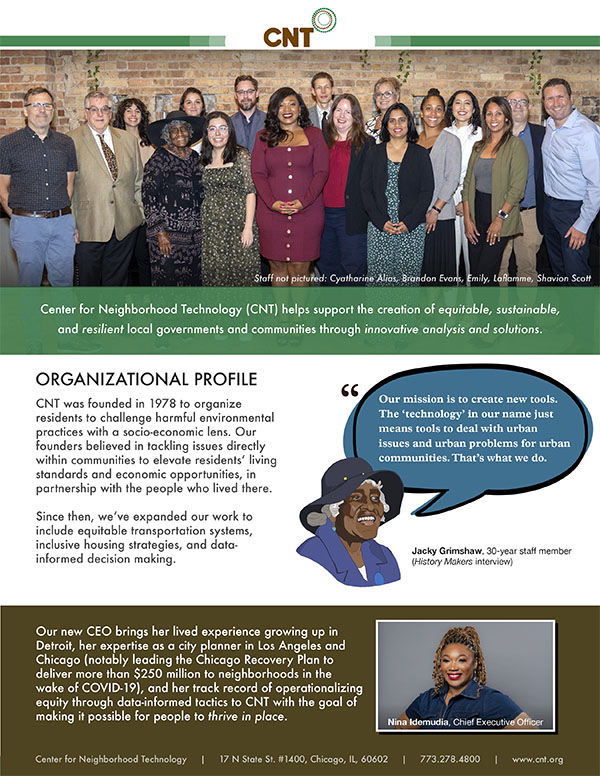
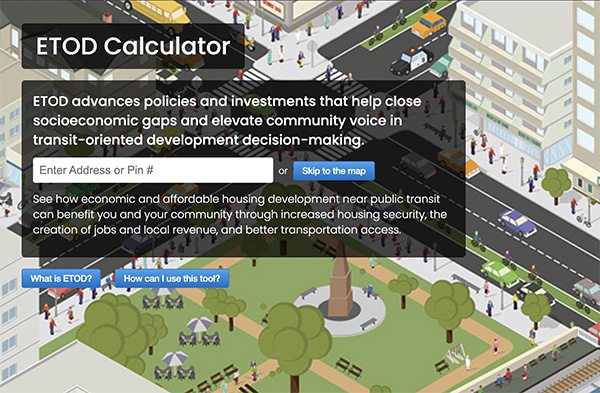
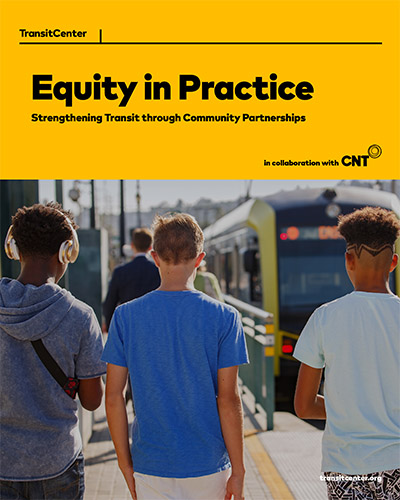
 Strengthening Transit Through Community Partnerships
Strengthening Transit Through Community Partnerships


